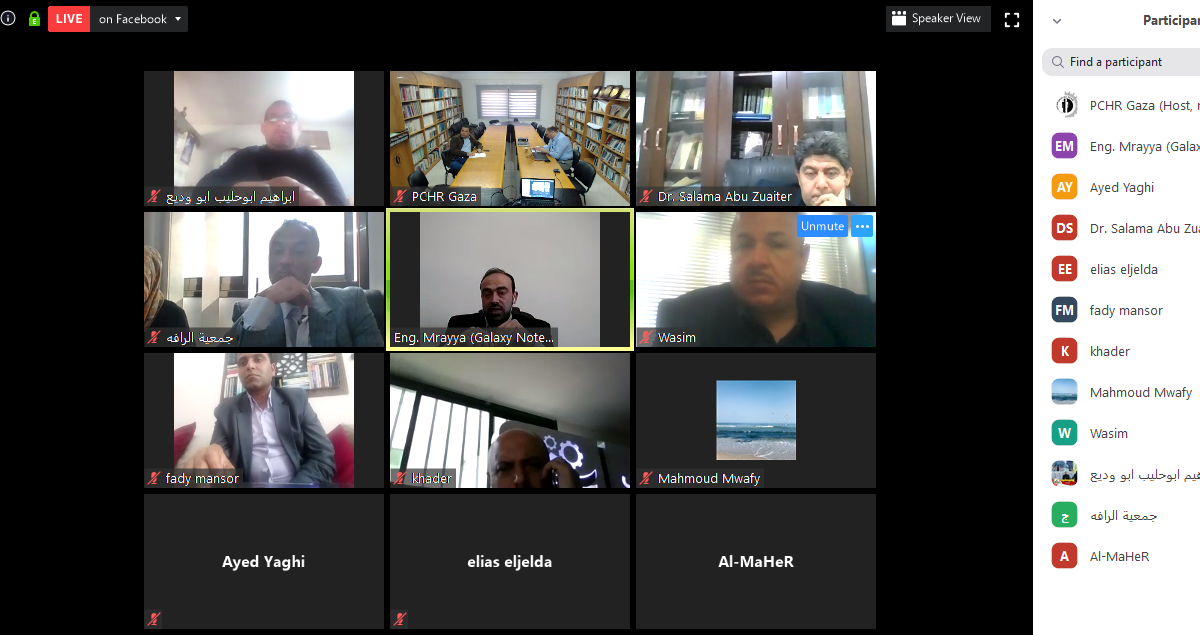
Ref: 17/2020
On Wednesday, 22 April 2020, the Palestinian Centre for Human Rights (PCHR) organized an online workshop via Zoom, titled: ” Protection of Poor and Low-Income Families in the State of Emergency.”
PCHR researcher, Fadel al-Muzaini, opened the workshop, welcoming the attendees and participants. The aim of the workshop was to discuss the repercussions of the coronavirus state of emergency on poor and low-income households in the Gaza Strip, and to explore support and protection mechanisms for those affected, who are already suffering from harsh living conditions due to the Israeli-imposed closure on the Gaza Strip for the last 13 years.
Al-Muzaini emphasized that the state of emergency, paired with the ongoing Israeli closure, perpetuated the humanitarian and living crises for the Gaza Strip population, especially poor and low-income families. In addition, thousands of day laborers have lost their sources of income that sustained their most basic needs and day-to-day necessities of their families.
Mr. Mahmoud Muwafi, Deputy Director General of the General Department for Family Affairs at the Ministry of Social Development, pointed out in his intervention to “the government’s role and ministry’s efforts in supporting poor and affected families under the state of emergency.” Muwafi stressed that since the beginning of the coronavirus pandemic, Gaza government and Ministry of Social Development continued to support citizens in the quarantine centers and day laborers by providing 2,000 food parcels and 60,000 purchase vouchers.
Mr. Maher Abu Rayia, Director General of the International and Arab Cooperation at the Ministry of Labor, clarified in his speech on “the government’s role in supporting day laborers in the state of emergency” the standards adopted by the Ministry of Labor in distributing aid, including food parcels and purchase vouchers, for 10,000 day laborers in the Gaza Strip based on the damage they sustained and other criteria.
Abu Rayia pointed out that education, including daycare centers and private schools, tourism and hospitality, and transportation are the most prominent sectors affected by the state of emergency, and all of them received support from the government.
Abu Rayia called upon the Palestinian National Authority (PNA) to raise the level of its services and support day laborers in the Gaza Strip by allocating budgets for them and ensuring that they get benefits from “Waqfat ‘Izz Fund” that was established in the West Bank.
Mr. Khader Shniwra, Executive Director of the General Federation of Palestinian Industries, said in his intervention on “repercussions of the state of emergency on workers in the industrial sector” that the industrial sector is directly affected by the state of emergency in the Gaza Strip, as the number of operating factories decreased from 1,865 to 1,220 which employ 9,000 workers. He added that the construction, tourism and hospitality sectors stopped working. It should be noted that Gaza government uses a number of hotels as temporary quarantine centers.
Mr. Wasim Mushtaha, Head of Palestinian Tourism and Travel Agency, discussed: “The consequences of the State of Emergency on Tourism and Travel Companies,” noting that 82 tourism and travel companies, that provide the main source of income to at least 400, are almost completely shut since the state of emergency and the ban on civilians’ travel. These companies are under the threat of shutting down and not being able to cover operational costs and pay their staff salaries. Mushtaha added that tourism and travel companies appealed to the Palestinian government in Ramallah and the Gaza Strip to offer aid or help to them, but the companies did not receive a response from any party, although they paid their commitments to the government before imposing the state of emergency. Mushtaha pointed out to the possibility of canceling this year’s Hajj season, which means inevitable closure for a large number of tourism and travel companies in Gaza.
Dr. Salama Abu Zaiter, Member of General Secretariat of Palestine General Federation of Trade Unions, reviewed “the impact of the state of emergency on the reality of Gaza Strip workers”, noting that the state of emergency raised unemployment to unprecedented rates in the Gaza Strip, and the most affected groups were the day laborers, who lost their work and income. Dr. Abu Zaiter called for providing programs to help and support workers who are unable to provide their family’s basic needs. He also demanded monitoring workers’ rights, especially that some private workplaces deducted the home quarantine from employees’ annual days-off.
At the end of the workshop, the participants concluded a sum of results, the most important of which are:
It is worth mentioning that this workshop comes within a series of workshops organized by PCHR’s Economic, Social and Cultural Rights Unit. The workshop highlights the deterioration of the economic, social and living conditions of Gaza Strip population under the Israeli imposed closure, the internal Palestinian division, and the state of emergency in force in the Gaza Strip to combat the spread of the new coronavirus COVID -19.
It should be noted that the workshop was broadcast and transmitted live on PCHR’s Facebook page and thousands of followers watched it. To see the full proceedings of the workshop, click the following link:
… [Trackback]
[…] Find More Information here on that Topic: pchrgaza.org/pchr-organizes-workshop-titled-protection-of-poor-and-low-income-families-is-a-necessity-in-the-state-of-emergency/ […]